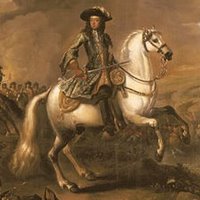Deliverance and Compromise in Scotland, but Continued Suffering in Ireland under William III
 1688 “The Glorious Revolution” – William of Orange lands at Torbay in
1688 “The Glorious Revolution” – William of Orange lands at Torbay in Tyrconnell raises the Jacobite forces in
1689 William and Mary accede to the English (12th February) and Scottish (11th April) thrones.
Although the English Parliament declares that James had forfeited the throne by ‘abdicating’ and fleeing for France, the Scottish Parliament, in the Claim of Right Act, declares that he has also forfeited the crown not by ‘abdicating’ but through illegal and tyrannical actions which he committed. This list is in many cases similar to those set forth by the United Societies at Sanquhar.
The Scottish Parliament abolishes Episcopacy by the Prelacy Act and declares its purpose to establish the form of church government that is most agreeable to the people, rather than that which has divine right from the Bible.
The General Assembly of the Established Church of Scotland is re-constituted (20th May) and the ministers from
The Strict Covenanters called the United Societies (nicknamed the Cameronians) spend their General Meetings in this period debating their response to William III, the new government and the newly Established Presbyterian Church of Scotland.
Bloody Claverhouse, the great persecutor of the Covenanters, raises the standard for the Jacobites in
James lands in
1690 Battle of the Boyne – James’ Irish forces are decisively beaten on 12th July and he abandons his forces for
The United Societies divide over their response to the new church and state: some join the newly Established Presbyterian Church of Scotland and support the Williamite government, including all three Scottish ministers (Shields, Linning and Boyd), while others reject both.
The Society People who reject the new establishment (sometimes termed “the Old Dissenters”), led by the ruling elder Robert Hamilton, see themselves not as seceding from the Church of Scotland, but as being the “poor, wasted remnant” of the “true Presbyterian Church of Scotland”. These were to form the Reformed Presbyterian Churches of
1691 The first Synod of Ulster since the time of Charles II is held (8th April), but the only minister of the Irish United Societies, David Houston, does not join it.
The Irish Jacobites are completely beaten at the Battle of Aughrim (12th July).
William offers the Jacobite Highland Clans a pardon (17th August) if they take an oath of allegiance by 1st January 1692. James allows the Highlanders to do this and some manage to take the oath before the allotted time.
1692 After the Massacre of Glencoe (13th February), most of the
1696 David Houston of the Irish United Societies dies, leaving them without an Irish-based preacher for 61 years.
1697 The Irish Presbyterians begin to be harassed again by the Episcopal authorities in
– not being permitted to bury their dead without an Episcopal clergyman,
– not being permitted by many Episcopalian gentry from building Presbyterian church buildings on their land (the land was mainly controlled by the gentry),
– being compelled to pay tithes and other duties to the Episcopal clergymen,
– being compelled to become Episcopal church wardens and take certain official oaths against their consciences,
– being prohibited from having Presbyterian school teachers,
– the libelling of Presbyterian ministers for performing marriages,
– the libelling of the marriage parties as having committed fornication and their children declared as illegitimate, and,
– the overruling of Presbyterian local government appointments by the central government.
The Church of Scotland was restored to a large measure of spiritual freedom and liberty, but the Williamite Government established Presbyterianism in
The reasons for dissent from the Established Church of Scotland by the remnant of the United Societies may be summarised as follows:
1. The Church was not merely established, but was Erastian in character, and compromised the sole headship of Christ over His Church. (Erastianism refers to state control of the Church, as opposed to Establishmentism, where the state supports the Church.)
2. The vast majority of the preachers had compromised the Kingship of Christ over His Church in accepting the indulgences of the Stuart Kings, and had not confessed their sin, nor repented of it.
3. Some of the ruling elders in the Church had been foremost in the persecution of the brethren and had blood on their hands. Many, if not all, were also involved in many lesser crimes and compromises. There was no attempt to discipline these men.
4. The state of Reformation of the Church was degraded and had been based on the Acts of Parliament of 1592, rather than those of the Second Reformation of 1638.
5. The solemn Covenants that the nation and Church had made with God had been trampled under foot. These Covenants had a descending obligation because of the nature of the parties: both the nation as represented by the civil government and the Church as represented by the elders were moral, or legal, bodies whose obligations continued as long as the bodies did. These entities still existed at the time of the Revolution Settlement (and they do today) and so were (and are) still under obligation. For the same reasons, treaties between countries continue to have a binding obligation even though those who made it are dead. Sadly, nations might be held to account for their oaths with other nations, but not those with God!
For these reasons, they would be without preachers for some years because they had to wait until a properly ordained preacher would either leave the Establishment, or be trained and ordained in a foreign church, as Renwick and others had been.
The United Societies remnant’s opposition to the sinful and unlawful state of the civil government led them also to absolutely reject the civil government and refuse any recognition of it. Several would be temporarily imprisoned for this
Labels: Church History, Irish Church




0 Comments:
Post a Comment
<< Home